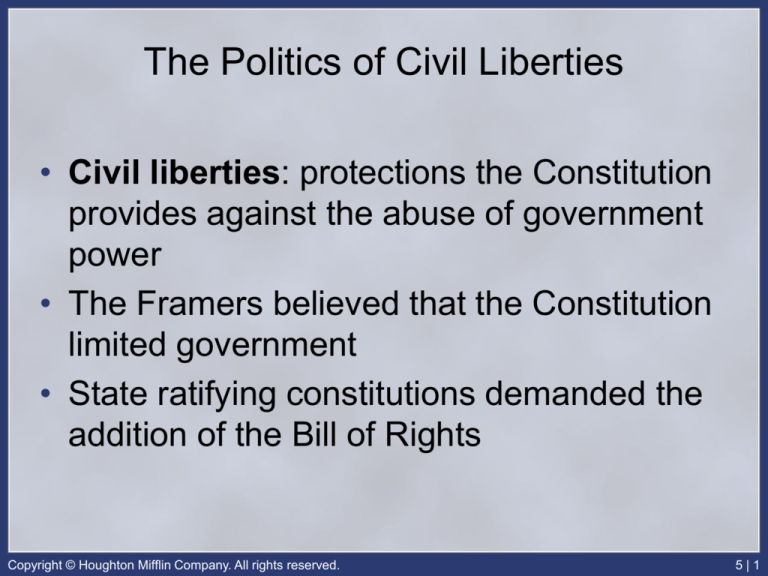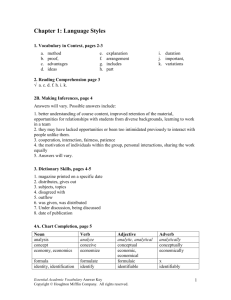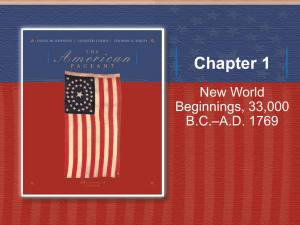
The Politics of Civil Liberties
• Civil liberties: protections the Constitution
provides against the abuse of government
power
• The Framers believed that the Constitution
limited government
• State ratifying constitutions demanded the
addition of the Bill of Rights
Copyright © Houghton Mifflin Company. All rights reserved.
5|1
Culture and Civil Liberties
• The Constitution and Bill of Rights contain
a list of competing rights and duties
• War has been the crisis that has most often
restricted the liberty of some minority group
• Conflicts about the meaning of some
constitutionally protected freedoms
surround the immigration of “new” ethnic,
cultural, and/or religious groups
Copyright © Houghton Mifflin Company. All rights reserved.
5|2
Figure 5.1: Annual immigration, 1840-1996
Statistical Abstract of the United States, 1998, 10.
Copyright © Houghton Mifflin Company. All rights reserved.
5|3
The Fourteenth Amendment (1868)
• Due Process Clause: “no state shall
deprive any person of life, liberty or
property without due process of law”
• Equal Protection Clause: “no state shall
deny to any person within its jurisdiction the
equal protection of the laws”
Copyright © Houghton Mifflin Company. All rights reserved.
5|4
Supreme Court Cases
• 1897: no state can take private property without
just compensation
• 1925 (Gitlow): federal guarantees of free speech
and free press also apply to states
• 1937 (Palko v. Connecticut): certain rights must
apply to the states because they are essential to
“ordered liberty” and they are “principles of
justice”
• These cases begin the process of “selective
incorporation”
Copyright © Houghton Mifflin Company. All rights reserved.
5|5
Libel
• Libel: a written false statement defaming
another
• Slander: a defamatory oral statement
• Public figures must also show the words
were written with “actual malice”—with
reckless disregard for the truth or with
knowledge that the words were false
Copyright © Houghton Mifflin Company. All rights reserved.
5|6
Obscenity
• 1973 definition: judged by “the average person,
applying contemporary community standards” to
appeal to the “prurient interest” or to depict “in a
patently offensive way, sexual conduct
specifically defined by applicable state law” and
lacking “serious literary, artistic, political, or
scientific value”
• Balancing competing claims remains a problem:
freedom v. decency
Copyright © Houghton Mifflin Company. All rights reserved.
5|7
Symbolic Speech
• Cannot claim protection for an otherwise
illegal act on the grounds that it conveys a
political message (example: burning a draft
card)
• However, statutes cannot make certain
types of symbolic speech illegal: e.g., flag
burning is protected speech
Copyright © Houghton Mifflin Company. All rights reserved.
5|8
The Establishment Clause
Congress shall make no law respecting an establishment of religion, or
prohibiting the free exercise thereof...
• Government involvement in religious
activities is constitutional if it meets the
following tests:
– Secular purpose
– Primary effect neither advances nor inhibits
religion
– No excessive government entanglement with
religion
Copyright © Houghton Mifflin Company. All rights reserved.
5|9
The Free Exercise Clause
Congress shall make no law respecting an establishment of religion, or
prohibiting the free exercise thereof...
• Insures that no law may impose particular
burdens on religious institutions
• But there are no religious exemptions from
laws binding all other citizens, even if that
law oppresses your religious beliefs
• Some conflicts between religious freedom
and public policy continue to be difficult to
settle.
Copyright © Houghton Mifflin Company. All rights reserved.
5 | 10
Exclusionary Rule
• Exclusionary rule: evidence gathered in
violation of the Constitution cannot be used in a
trial
• Stems from the Fourth Amendment (freedom
from unreasonable searches and seizures) and
the Fifth Amendment (protection against self
incrimination)
• Mapp v. Ohio (1961): Supreme Court began to
use the exclusionary rule to enforce a variety of
constitutional guarantees
Copyright © Houghton Mifflin Company. All rights reserved.
5 | 11
Search and Seizure
• With a properly obtained search warrant: an order
from a judge authorizing the search of a place
and describing what is to be searched and
seized; judge can issue only if there is probable
cause
• What can the police search, incident to a lawful
arrest?
– The individual being arrested
– Things in plain view
– Things or places under the immediate control of the
individual
Copyright © Houghton Mifflin Company. All rights reserved.
5 | 12
Confessions and Self Incrimination
• Miranda case: confessions are presumed
to be involuntary unless the suspect is fully
informed of his or her rights
• Courts began allowing some exceptions to
the rule
Copyright © Houghton Mifflin Company. All rights reserved.
5 | 13
Terrorism and Civil Liberties
• U.S. Patriot Act meant to increase federal
government’s powers to combat terrorism
• An executive order then proclaimed a
national emergency; non-citizens believed
to be terrorists, or to have harbored a
terrorist, will be tried by a military court
• Many controversial provisions of the Patriot
Act automatically expired in 2005
Copyright © Houghton Mifflin Company. All rights reserved.
5 | 14
14th Amendment
• “No State shall make or enforce any law which
shall abridge the privileges or immunities of
citizens of the United States; nor shall any State
deprive any person of life, liberty, or property,
without due process of law; nor deny to any
person within its jurisdiction the equal protection
of the laws.”
• Makes most rights contained in the Bill of Rights
applicable to the states
• Civil Right Act of 1964 passed by Congress in
order to better enforce the 14th Amendment
Copyright © Houghton Mifflin Company. All rights reserved.
5 | 15
Rights of Free Speech and Assembly
• A majority of US citizens agree in principle
with these rights, but in practice many
people are often intolerant of views they do
not support
– Clear and Present Danger Test
• Schenck v US (1919)
– Fighting Words Tests
• Chaplinsky v New Hampshire (1942)
• Terminiello v Chicago (1949)
• Feiner v NY (1951)
Copyright © Houghton Mifflin Company. All rights reserved.
6 | 16
Criminal and Civil Cases
• Criminal Cases-the litigation is always filed
by the government, who is called the
prosecution.
• Civil Cases-a private party (e.g., a
corporation or individual person) files the
lawsuit and becomes the plaintiff.
• Most criminal cases in the US end in a plea
bargain negotiated by the defense and
prosecution
Copyright © Houghton Mifflin Company. All rights reserved.
5 | 17
Judicial Restraint
• Those who believe that the Supreme Court in
its rulings should defer to the elective
institutions of government
• This goes along with “strict constructionist”
Copyright © Houghton Mifflin Company. All rights reserved.
5 | 18


